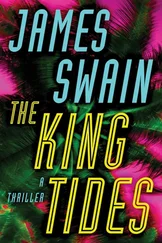“Honey, don’t call people names,” Barb said. “I’m sure they’re very smart.”
“That’s what nerd means, Mom. Smart.”
“That can’t be a bad thing, then, can it?” Barb said.
“No, it’s not bad ,” Quinn said. “It just is .”
“I don’t like your tone,” Barb said.
Quinn said nothing for a long moment and in the silence Keith speared a cube of pork chop with the end of his fork. “I think it would be really good for you,” he said. “Going to a school like that.”
“Sounds like it’s for super-smart kids.”
“You don’t think you’re smart enough?” he said.
“I don’t know,” she said.
He looked up at her now. His daughter. “Then what is it?” he said.
“Because it’s nerd school.”
“You mean the reputation of the school?”
“Yeah, it’s for nerds.”
“Who cares?”
“I do,” she said.
And then Barb, from across the table: “Really, Keith?”
“She’s smart,” he said.
“I know she’s smart,” Barb said, “but private school? Do you know how much something like that costs? Maybe we should talk about this later.”
“It’s probably expensive,” he said. “But that’s not a good reason not to do it.”
“It’s not?”
“We’d have to make some sacrifices.”
“Hello, parents. I’m still here,” Quinn said.
“Quinn, listen,” he said.
“I am listening. You guys are freaking me out.”
“Don’t freak out,” he said. “There’s no reason to freak out.”
“Well, then don’t make me freak out,” she said. “We just moved and now you want to put me in some weird school.”
He sat there at the table, not speaking now. He had not even brought up any of the aspects of the school he found particularly interesting or useful, had not even brought up how it might help her embrace the gift he now knew she possessed and which public school had not accessed at all. Already he felt defeated.
“Christ, you two,” he said. “I’m trying to help here.”
Quinn was quiet. Then she said, “I know, Dad. I know you are.”
“Can we at least not call it ‘nerd school’?” he said.
“What should we call it then?”
“The academy.”
“The Academy of Nerds?”
“Quinn, that’s enough,” Barb said.
“OK, OK,” she said. She was smiling though, seemingly on the verge of laughter.
“It’s a good school,” he said.
“It’s for smart people.”
“You are smart people.”
“Yeah, but not like that.”
“Yes, like that.”
“No, I mean, not like they are. They’re … like you.”
“Like me? What do you mean?”
She was silent now, staring at her plate.
“Seriously, Quinn, what do you mean?”
“Can you just drop it?” Barb said.
“No,” he said. There was no anger or irritation in his voice, perhaps because it did not occur to him what she meant. So he said it again, “What, Quinn? What?”
“Dad, it’s just … you know …”
“No, I don’t know.”
She still would not look at him, her eyes focused on her plate. Her peas. Her pork chop. “You’re not, like, normal.”
“I’m not normal?”
“Don’t be mad.”
“I’m not mad.”
“I don’t mean it like it’s bad.”
“How do you mean it then?”
“You know … you’re, like … different.”
“Different how?”
“Can we talk about something else?” Barb said.
He did not respond or even look at his wife until he felt her hand on his arm. Then he turned. Her eyes were wide and the look on her face was one of concern.
“We’ll talk about this later,” Barb said. “Can’t we? Can’t we talk about this later?”
He was quiet for a moment. Then he said, “OK. Later then.”
“Thank you,” Barb said. “Now let’s talk about something else.” She exhaled audibly and turned back to her dinner plate. “How was work?” she said.
“Fine,” he said. “Work was fine.”
Then it was quiet at the table, each of them chewing, focused on their dinner plates. On pork chops. On rolling green peas.
In the months that followed, he might have continued to press her on the issue of the school, or at least might have focused on her progress. Later he would pick apart his inability to do so but at the time his own life had become a frantic push. Missions were constantly in development and his engineering work was regularly going up with those missions. He was in ongoing communication with astronauts and like-minded research scientists and while there was, of course, some level of bureaucracy to deal with, the work itself was everything he had ever wanted. For the first time he could see himself actually becoming an astronaut, that ideal goal solidifying out of the dream or fantasy it had been in New Jersey so many years ago and achieving an incandescence fueled not only by his own desire and ambition but also by many of the high-level personnel at the research center, several of whom told him point-blank that they would love to see him apply for the astronaut training program in Houston and that they would be willing to help him get there.
For the first time, too, he was encountering physicists who worked with mathematical ideas he was utterly unfamiliar with, material that seemed in many ways to be completely impractical and yet was apparently providing at least partial answers to huge questions about how the universe itself functioned: its size, its shape, its speed, its lifespan. The mathematics here were staggering and he found himself drawn to the ideas even as they unsettled him. All his life he had focused on the tangible, the physical, the direct application, and some of the abstraction necessary for the enormous questions being asked was beyond his ability to embrace, if not understand.
It reminded him of his first encounter with fractals and chaos theory, and indeed more than one of the scientists at Dreyfuss had images of fractals pinned to the walls of their offices and labs: filigreed and ornamented shapes like flaming dragons comprised of delicate ferns, fire, soap bubbles, and snowflakes — all of which was, in actuality, the graphed results of subtly changing algorithms repeated thousands, hundreds of thousands, of times. He had been a junior in high school when he had first encountered similar images, these from a library book that he had checked out among several others. He had long since forgotten the other books but he had not forgotten the book on fractals. At the time he had heard of the subject but knew very little about it. And so he lay upon his bed after dinner and read captions about the Mandelbrot set and the dragon sweep and the Peano-Gosper curve and the Koch snowflake: all images presented in the text and all of which he viewed as mere mathematical curiosities or games, diversions that a mathematician might perform to pass the time. There were algorithms in the book and he punched one into his home computer — a rare gift from his parents upon the start of high school, rare because they could not afford such extravagances — and then turned to the other books, and later his homework, and then to the shower and his bed.
The next day he returned home from school and did not even think of the computer, had completely forgotten about what he had typed into it the previous evening, so that when he went to the screen long after dinner and saw the blocky bitmapped image there he did not at first know what it could be: a series of circles within circles, all of them arrayed in a kind of arc not unlike an oversize necklace. Then he remembered the algorithm, the math he had asked the computer to work on and realized that it had been working on that algorithm ever since, for over twenty-four hours, and what he was viewing now was the result of that period of time, the extent of what the computer could calculate. He changed the scale on the graph to highlight one of the smaller circles and realized then what he might have already known had he read the text more carefully: that each of the circles was comprised of yet smaller circles and these too were comprised of even smaller circles. The image might have gone on like that forever had he a computer capable of the calculation.
Читать дальше












